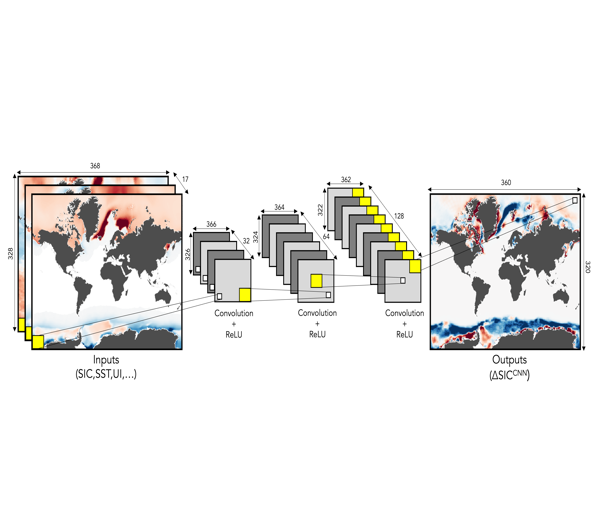M²LInES at AGU 22

AGU M²LInES Highlights
The M²LInES team is excited to present our recent scientific advances at the Fall 2022 AGU meeting in Chicago and online. Below is a summary of the talks (all times are CST). For your convenience, you can download the schedule for the talks by following this link .
Machine learning for physics discovery & modeling
We have an extensive lineup of talks and posters from M²LInES team members and affiliates. These presentations focus on the core topics of M²LInES: leverage data and machine learning to improve climate models and projections. This ranges from discovering physics from data to quantifying uncertainty in climate predictions.
Monday, Dec 12 (3.25 pm - 6 pm): Pierre Gentine will present atmospheric physics examples on how Machine Learning can help discover new physics in an invited talk (Session NG15A). Abigail Bodner will kick off the NG-16A session (4.45 pm), co-organized by VESRI members, with an invited talk on alternate approaches for ocean submesoscale parameterization with neural networks. She will be followed by Mohamed Aziz Bhouri, discussing a Bayesian Machine Learning Method for Parameter Inference and Model Closure of Dynamical Systems (Abstract). In the same session, Cheng Zhang will present his recent work on implementing a convolutional neural network parametrization into the MOM6 Ocean Model (Abstract).
Tuesday, Dec 13 (9 am - 12.30 pm): Aakash Sane will present his poster in session NG22B on parametrizing vertical Turbulent Mixing Coefficients in the ocean surface boundary layer with machine learning and recent implementation in a global ocean model.
Wednesday, Dec 14 (2.45 - 5 pm): In the afternoon, Laure Zanna will kick off the session OS35A (2.45 pm) with an invited talk, presenting the work of Andrew Ross, which provides a framework for systematically benchmarking the online performance of coarse resolution models and introduce a new algorithm for discovery equations from data. In this invited talk in H36C (5.05 pm), Pierre Gentine presents a novel framework for terrestrial carbon and the water cycle that uses the power of automatic differentiation (autodiff) in a carbon-water model coded in Julia (Abstract).
Wednesday, Dec 14 (5- 6 pm): Several talks on Wednesday afternoon will embrace stochastic approaches for parameterizations of atmospheric and oceanic processes. Sara Shamekh will be speaking about her recent work on how including information related to the distribution of clouds using a Neural Network significantly improves the prediction of precipitation (Abstract). She will be immediately followed by Pavel Perezhogin presenting his work parametrizing ocean mesoscale eddies in an idealized ocean model with generative models. Finally, an invited talk by Arthur Guillaumin in the same session will discuss Deep Learning approaches for non-Gaussian stochastic parameterizations of ocean momentum forcing.
Thursday, Dec 15: Pierre Gentine (11.25 am) will introduce a novel neural network architecture that combines two auto-encoders to parameterize the vertical turbulent flux of different scalars and decompose it into the main variability modes (Abstract).
Machine learning & data assimilation
Machine learning methods can be leveraged to design data assimilation products and learn what is missing from underlying models used for data assimilation.
Tuesday, Dec 13: in H22D, Feiyu Lu (09.50 am) will introduce his work on improving data assimilation ensembles using a U-Net Kalman Filter to predict ensemble covariance matrices.
Friday, Dec 16 (9 am - 12.30 pm): Will Gregory will present his poster (C52C) on using deep Learning to predict systematic model error from sea ice Data Assimilation Increments in a fully coupled climate model.
Ocean and Sea-Ice Dynamics
Tune in to hear about sea-ice predictions, quantifying and predicting sea level extremes, and ocean eddy fluxes in models and observations to understand multiscale interaction in the ocean and climate system.
Monday, Dec 12: At 11:32 am, Fabrizio Falasca will present his work, in session PP13A, on quantifying climate change in the Indo-Pacific Basin From mid-to late Holocene.
Tuesday, Dec 13 (9 am - 12.30 pm): Dhruv Balwada’s poster, in session NG22B, focuses on a practical and unambiguous way to diagnose eddy fluxes in a 3D turbulent simulation.
Wednesday, Dec 14 (9 am - 12.30 pm): Andrew Brettin will present his poster on constraining estimates for South American sea level extremes using uncertainty-permitting Machine Learning (OS32C).
Thursday, Dec 15: At 1.50 pm, Elizabeth Yankovsky will start session OS44B by presenting some of her work with the Climate Process Team on exploring Mesoscale Eddy Vertical Structure Regimes (Poster presentation).
Friday, Dec 16: In GC52B, Mitch Bushuk (09:13 am) compares different models that predict September sea ice extent for both pan-Arctic and regional prediction (Abstract).
Friday, Dec 16 (2.45-6.45 pm): Fabrizio Falasca will discuss his work onexploring changes in coastal sea level distributions in observations and climate models at the PP55D poster session (Abstract).



